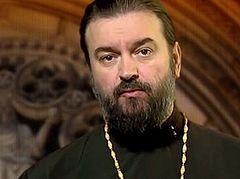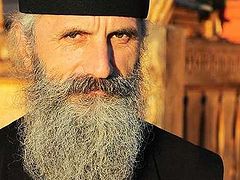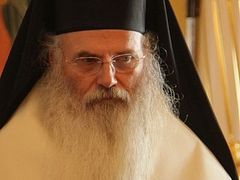 A still from the movie “The Island”
A still from the movie “The Island”
Many of you watched the 2006 Russian movie by Pavel Lungin, “The Island”, some more than once. There was something in this movie that tugged at your heartstrings, there were other things you didn’t understand, and some things were a revelation for you. But what is this movie about? In order to answer this question I will try to focus on just one image—that of coal. Perhaps it will reveal the movie’s main message to us.
The obedience of the lead character, Fr. Anatoly (played by Pyotr Mamonov), is to oversee the monastery boiler house. He is a coal stoker. And it is no coincidence.
Fr. Anatoly’s boiler room, his face always black with soot, a pile of coal, a cart on which he transports coal every day after chopping it off a huge pile on the seashore, make up the major scenes of the movie.
At the very beginning Fr. Job (played by Dmitry Dyuzhev) suggests that the main character leave the boiler house because this work was assigned to a novice. And what next? Fr. Anatoly protests, begging and trying to persuade them to allow him to keep on being a stoker—and he succeeds. He has to be there! He sees his work precisely in this place and he won’t abandon it till his death.
And he is not afraid of getting dirty; he had already soiled himself with sin, which is far worse than soot.
For that matter, in this movie coal is a way of “burning-out” sin, the renunciation of vice. Thus, the boiler house gave the impetus to Abbot Philaret’s (played by Viktor Sukhorukov) spiritual growth. And what about the doorknob covered with soot, as if intended specially for Fr. Job?!
Fr. Anatoly and his boiler room continually appear throughout the movie. It is here that he speaks with people, it is here that he asks for Fr. Job’s and Tikhon’s (played by Yury Kuznetsov) forgiveness before his repose. And it is on this same pile of coal (which, as we note, doesn’t shrink until the very end of the movie, and therefore till the end of his life) that Fr. Anatoly lies down in the coffin and passes away, placing his hope on the merciful God. Even the coffin (in which Fr. Anatoly lies down) Fr. Job deposits on the pile of coal (!) and not beside it—it is placed askew and in a slapdash manner.
“Fr. Anatoly, are you afraid of death?” Fr. Job asks the elder.
“Death?... I am not afraid of it… But it will be terrifying to stand before the Lord… The burden of my sins weighs me down.”
No matter the weather, Fr. Anatoly wheels his cart, walking over a wooden deck towards the scattered coal, then breaks it off (he literally has to chop it off!), fills the cart up and rolls it back to the boiler house. The work in the boiler room as well as in Fr. Anatoly’s heart continues every day—hard and seemingly never-ending work.
The themes of coal and fire in the plot of “The Island” are interrelated. The latter is represented by the fire that broke out in Abbot Philaret’s cell, who then goes to Fr. Anatoly without realizing that the elder’s obedience as a stoker was his own choice.
But was the fire in his cell so terrible if his face got covered in soot anyway in the boiler house?
“I hardly have any virtues, but I do have many sins,” he says with tears in his eyes, sitting next to Fr. Anatoly. Black coal revealed itself even there, causing a real, purifying fire.
We can draw an analogy. Fr. Anatoly breaks off a piece of hard, black coal and burns it in the boiler furnace, just as Christians “uproot” their sins which burn up through repentance, prayer and partaking of Communion (let us recall the words from the prayers after Holy Communion: “O my Creator, let me not be scorched, Thou Who art fire that doth consume the unworthy…”).
Prayer and repentance, repentance and prayer for himself and all the suffering are the great podvig of a toiler for Christ. And the pile of coal never shrinks… The hands are black, the face is sooty, and there is no peace in the soul… And you can only hope in God’s mercy.
But don’t think that there is no light in the movie. Where there is repentance, there is light. Light can be found in Fr. Anatoly’s clairvoyance, in his help to all who come to him seeking counsel and consolation (which is unquestionably true), in Tikhon’s miraculous coming back to life and gratitude for his daughter’s healing, and in the blue of the cloudless sky, against the background of which Fr. Job carries Fr. Anatoly’s bulky and unwieldy cross. Though reeling and swaying on his feet, he moves forward without falling.
I recommend that you watch this movie again.




